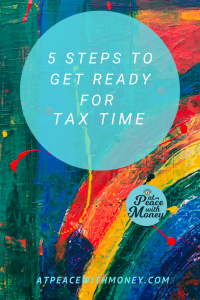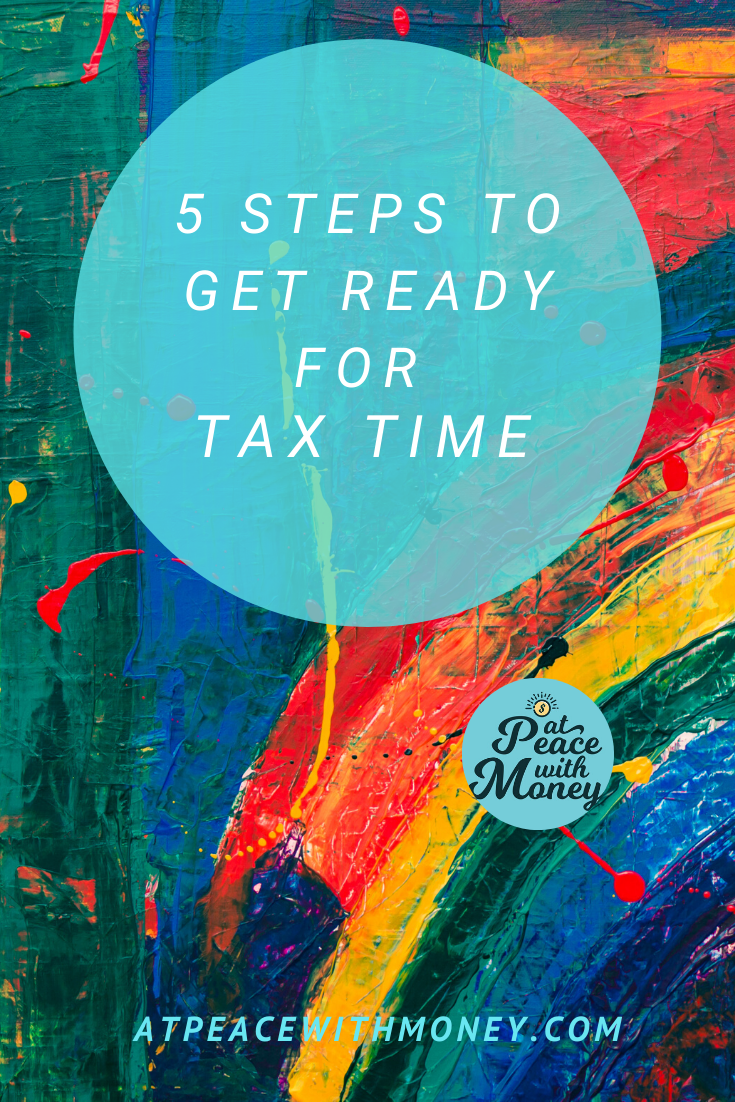5 Steps to Get Ready for Tax Time

Yep, it’s that time of year again! As a small business owner, or let’s face it, just as an individual, tax time can be stressful. But there are ways to reduce that stress and be ready for tax time before you know it. As a former tax preparer and practicing bookkeeper, here are my top suggestions;
#1 – Designate a folder or box for all the mail that arrives regarding taxes. You don’t even have to open the envelopes just collect it all in your “spot”. Super simple!
#2 – If you are doing your banking online, you are probably getting email notifications that your tax statements are available. I like to flag these emails as they come in and then sit down when I have some time later in the week to go back through the emails, log in and download each statement from the bank. Save all of these to a file folder you’ll call 2017 Tax Documents.
#3 – If you are running a small business (and a side hustle does count), please, please, please tell me you have been running that business out of a bank account separate from your personal spending. If not, go open that separate account right now! If so, you can easily determine your income and expenses for the year by reviewing your bank statements. Better yet, if you are running your business on an accounting platform such as Quickbooks Online and you have updated and reconciled your accounts, those reports are right at your fingertips. I do suggest that you start this step in January just to give yourself plenty of time.
 #4 – You should have received all of your tax mailings by mid-February. If your tax preparer is going to want everything in electronic form (or you just want to stay super organized) scan all of your paper statements and add them to your 2017 Tax Documents folder.
#4 – You should have received all of your tax mailings by mid-February. If your tax preparer is going to want everything in electronic form (or you just want to stay super organized) scan all of your paper statements and add them to your 2017 Tax Documents folder.
#5 – Grab a copy of last year’s tax return and review the entries you had last year. Or if you have a digital file from last year, compare the statements with the information you have for this year. This can jog your memory so you know you haven’t missed anything. The last thing you want is to have to file a corrected tax return because you left something out, so just take the time and make sure you’ve got all of your information.
You did it! You are ready for tax time! And if #3 is causing you to pull out your hair, maybe it’s time to talk to a professional to help you set up a system or to decide if you are ready for ongoing proactive bookkeeping.
☮
Angela






 Earlier in this article, I mentioned that a financial planner can be a good reference, but another option is to simply meet with a planner at a firm as needed. I had one client who, when planning for retirement, made one appointment at a firm and got all her questions answered. No commitment needed, and a good source of advice.
Earlier in this article, I mentioned that a financial planner can be a good reference, but another option is to simply meet with a planner at a firm as needed. I had one client who, when planning for retirement, made one appointment at a firm and got all her questions answered. No commitment needed, and a good source of advice.



 My second reason for scheduling a bookkeeping review with a professional is so that someone with a trained eye can go over your books and help you discern where, when, and from what you made the most money. This kind of insight is invaluable to any small business, especially if your goal is growth. Your financial records hold this info. Work with someone willing to help you find it! For more about finding and working with a bookkeeper, check out
My second reason for scheduling a bookkeeping review with a professional is so that someone with a trained eye can go over your books and help you discern where, when, and from what you made the most money. This kind of insight is invaluable to any small business, especially if your goal is growth. Your financial records hold this info. Work with someone willing to help you find it! For more about finding and working with a bookkeeper, check out 


 To solve this problem, I recommend two things. First, work with a tax preparer or bookkeeper who will help estimate a percentage to be held out for taxes. You can read more of my advice about working with a
To solve this problem, I recommend two things. First, work with a tax preparer or bookkeeper who will help estimate a percentage to be held out for taxes. You can read more of my advice about working with a 


 #5 – Grab a copy of last year’s tax return and review the entries you had last year. Or if you have a digital file from last year, compare the statements with the information you have for this year. This can jog your memory so you know you haven’t missed anything. The last thing you want is to have to file a corrected tax return because you left something out, so just take the time and make sure you’ve got all of your information.
#5 – Grab a copy of last year’s tax return and review the entries you had last year. Or if you have a digital file from last year, compare the statements with the information you have for this year. This can jog your memory so you know you haven’t missed anything. The last thing you want is to have to file a corrected tax return because you left something out, so just take the time and make sure you’ve got all of your information.


 create a financially streamlined business. Strategizing to prepare for surprise expenses and taxes, offer more of your most profitable products or services at the optimal time of year, and remembering to pay yourself all contribute to financial success. If you’re interested in doing this analysis work with some professional help, I’m happy to speak with you. Take a look at
create a financially streamlined business. Strategizing to prepare for surprise expenses and taxes, offer more of your most profitable products or services at the optimal time of year, and remembering to pay yourself all contribute to financial success. If you’re interested in doing this analysis work with some professional help, I’m happy to speak with you. Take a look at